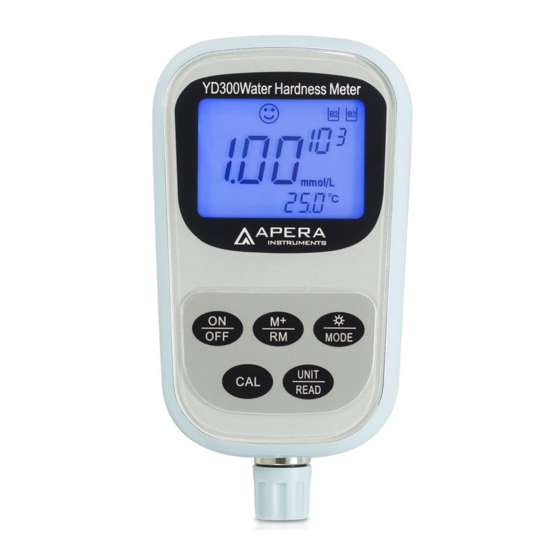Summary of Contents for Apera Instruments YD300
- Page 1 YD300 Portable Water Hardness Meter User Manual Apera Instruments, LLC aperainst.com...
-
Page 2: Table Of Contents
Table of Contents 1. Brief Introduction ................................3 2. Technical Specifications ..............................4 3. Meter Instructions ................................6 4. Operation ..................................7 4.1. Preparation ................................7 4.2. Notes During Measurement Preparations ......................... 8 4.3. Meter’s Calibration: (take B2/B3 calibration method and mmol/L unit as an example)..........8 4.4 Notes in Meter’s Calibration ............................. -
Page 3: Brief Introduction
1. Brief Introduction Thank you for purchasing Apera Instruments YD300 Portable Water Hardness Meter. Before using the product, please read this manual carefully to help you properly use and maintain the product. For technical support, please contact us at info@aperainst.com or +1 (614)-285-3080. -
Page 4: Technical Specifications
2. Technical Specifications 2.1 Units of Water Hardness and their Conversions mmol/L —basic unit for water hardness ) — water hardness based on quality concentration of CaCO mg/L (CaCO also known as ppm and U.S. Degree. mg/L (CaO) —water hardness based on quality concentration of CaO mmol/L (Boiler) —... - Page 5 2.2 Technical Parameters Water Hardness (0 to 10) mmol/L; (0 to 401)mg/L(Ca); (0 to 1000) mg/L(CaCO3); (0 to 100) º fH (France Degree); Measurement range (0 to 561) mg/L(CaO); (0 to 56)º dH (German Degree); (0 to 20) mmol/L(Boiler); (0 to 70) º eH (England Degree) Resolution 0.01 and 0.1 water hardness units Accuracy...
-
Page 6: Meter Instructions
Working conditions 5-35℃ (41-95º F) Working Temperature ≤85% Working Humidity Waterproof Rating IP57 Waterproof and Dustproof 3. Meter Instructions 3.1. LCD Display ① — Water hardness reading; adopts a modular form to express e.g. means 2.00× 10 ② — Measurement units; appears by following order: mmol/L, mg/L(CaCO ), mg/L(CaO), mmol/L(Boiler), º... -
Page 7: Operation
3.2. Keypad This meter has a total of five operating keys. Power button Button to control backlight; short press this button to turn on backlight, Long Press this button (press time > 2 seconds) to enter parameter setting mode Calibration button, press this button to enter meter’s calibration mode. Button for unit switch and confirmation, when in measurement mode, press the button to change measurement unit;... -
Page 8: Notes During Measurement Preparations
4.2. Notes During Measurement Preparations 4.2.1 When using, shake the electrode with force to make the inner solution of electrode fall into the compartment of the measuring head. There shouldn’t be any air bubbles in the measuring head. 4.2.2 When soaking or calibrating electrode, the calibration vial should be placed in the black metal pedestal to avoid spills. -
Page 9: Notes In Meter's Calibration
4.3.5 Rinse the electrode in distilled/deionized water and shake off excess water; insert it into B3 calibration solution; stir the electrode for a few seconds and let it stand still. Wait for the reading to fully stabilize (about 2 minutes). 4.3.6 Press button to confirm the 2 point calibration,... -
Page 10: Take Measurement
4.5 Take Measurement Pour your sample solution into the #1 or #2 sample vial (bottle). Rinse electrode with distilled/deionized water and shake off excess water; insert the probe into sample solution, stir gently and let it stand still; when icon appears and stays, take the reading. Press to save the measurement data. -
Page 11: Electrode Storage
4.7. Electrode Storage When measurement is finished, electrode should be stored in the protection cap after rinsing in distilled/deionized water. No solution is needed in the protection cap. 5. Meter’s Parameter Settings 5.1. Parameter Setting Table Prompt Parameter setting items Parameter ---- ----... -
Page 12: Temperature Units Setting (P3)
5.4. Temperature Unit Setting (P3) Press button under the P2 setting, meter enters temperature unit setting state P3. LCD display as in picture (5- 3), press button to change temperature units between ° C and ° F, button to confirm and return to measurement mode;... -
Page 13: On/Off Setting Of Restore To Default Setting (P7)
press button to confirm and return to measurement mode. The default setting is ON. When choosing ON, the automatic power off function is activated; the meter will power off automatically after 10 minutes if no operation; when choosing OFF, automatic power off function is cancelled. 5.8. -
Page 14: Recall Measurement Data
7. What’s in the Kit Item Quantity YD300 water hardness meter 601-S water hardness/temp. electrode AA alkaline batteries (1.5V) (installed) 100mL hardness calibration solution (B1, B2 and 1 for each... -
Page 15: Warranty
We warrant this instrument to be free from defects in material and workmanship and agree to repair or replace free of charge, at option of APERA INSTRUMENTS, LLC, any malfunctioned or damaged product attributable to responsibility of APERA INSTRUMENTS, LLC for a period of TWO YEARS (SIX MONTHS for the water hardness electrode) from the delivery. -
Page 16: Appendix :Error Message And Troubleshooting
Wear and tear Normal See 4.6.5. Membrane becomes Negative pressure within Loosen the measuring head and concave the electrode tighten it again. See 4.6.6. APERA INSTRUMENTS, LLC Address: 6656 Busch Blvd, Columbus Ohio 43229 Tel: 1-614-285-3080 Email: info@aperainst.com Website: aperainst.com...


















Need help?
Do you have a question about the YD300 and is the answer not in the manual?
Questions and answers